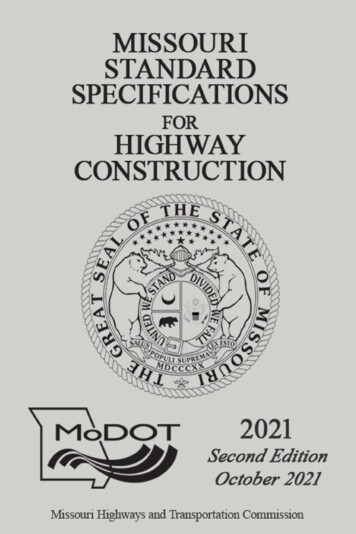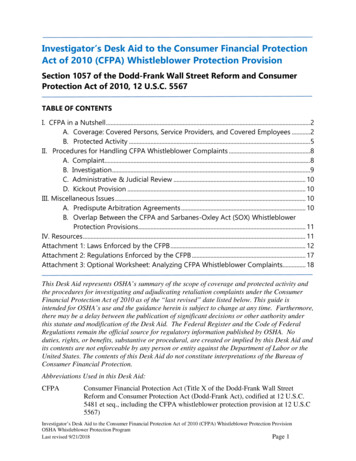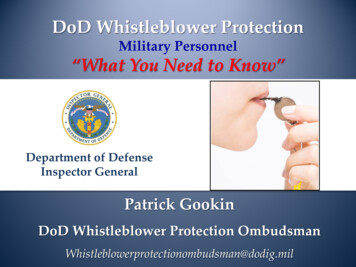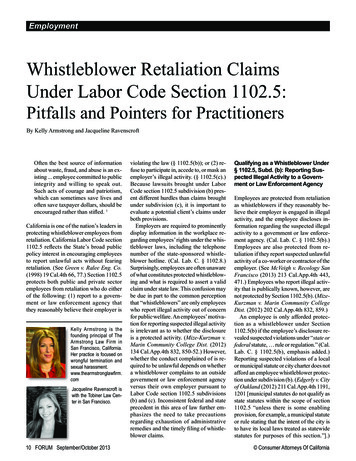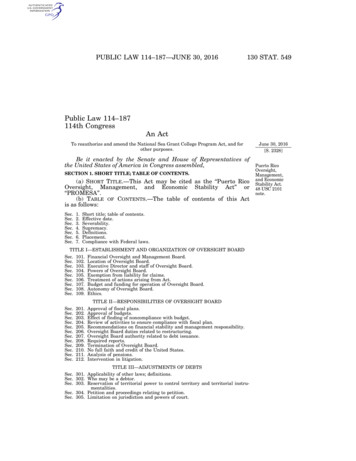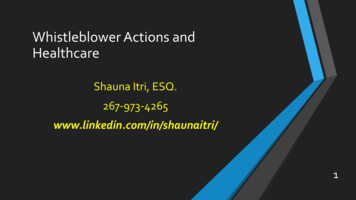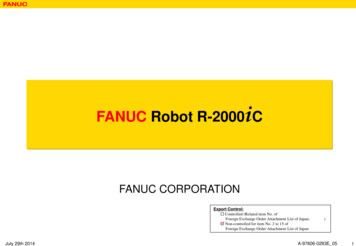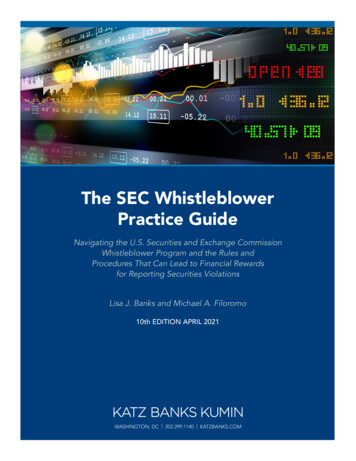
Transcription
The SEC WhistleblowerPractice GuideNavigating the U.S. Securities and Exchange CommissionWhistleblower Program and the Rules andProcedures That Can Lead to Financial Rewardsfor Reporting Securities ViolationsLisa J. Banks and Michael A. Filoromo10th EDITION APRIL 2021WASHINGTON, DC 202.299.1140 KATZBANKS.COM
SEC WHISTLEBLOWER PRACTICE GUIDETABLE OF CONTENTSINTRODUCTION.1BACKGROUND.2THE SEC WHISTLEBLOWER PROGRAM RULES.3A. Whistleblower Status.31. “Voluntarily Provide”. 42. “Original Information”. 4Independent Knowledge and Independent Analysis.5Exclusions from Independent Knowledge and Analysis—Attorneys, Compliance Personnel, Auditors, and Officers . 5Information “Not Already Known” and the “Original Source” Exception. 8B. Rules Designed to Incentivize Internal Reporting.9C. Information that Leads to Successful Enforcement Action. 10D. Monetary Sanctions Totaling More Than 1 Million. 12E. SEC Procedures for Submitting a Tip.121. The TCR Form.122. Submitting an Anonymous Tip. 13F. Determining the Amount of an Award. 141. SEC Enforcement Interests. 142. Unreasonable Delay in Reporting. 153. Culpability of the Whistleblower. 15G. Whistleblower Awards to Date.16H. Claiming a Whistleblower Award.17PROTECTIONS FOR WHISTLEBLOWERS AGAINST RETALIATION.18A. Employee Protections Under the Sarbanes-Oxley Act. 19B. Employee Protections Under the Dodd-Frank Act.19C. Extraterritorial Application of Whistleblower Protections.20D. Enforcement of Anti-Retaliation Provisions by the SEC.21E. Employer-Imposed Agreements That Impede Whistleblowers. 21THINGS TO THINK ABOUT BEFORE YOU TIP.23ENDNOTES.27APPENDIX.34 Copyright 2021i
SEC WHISTLEBLOWER PRACTICE GUIDEINTRODUCTIONCongress directed the U.S. Securities and ExchangeCommission (“SEC” or the “Commission”) to establish awhistleblower program as part of the Dodd-Frank Wall StreetReform and Consumer Protection Act of 2010 (“Dodd-FrankAct”).1 Under the rules of the SEC Whistleblower Program(“Whistleblower Program”), individuals who provide the SEC withoriginal information leading to an enforcement action that resultsin over 1 million in monetary sanctions are entitled to receive anaward ranging from 10% to 30% of the moneys collected.2The Whistleblower Program is now in its tenth year, and, sinceits inception, it has steadily gained momentum and influence.Between its first award in 2012 and January 31, 2021, the SECOffice of the Whistleblower has issued approximately 738 millionin awards to 134 individuals whose information led to successfulenforcement actions for violations of securities laws.3 Fiscal Year2020, which ended on September 30, 2020, saw a record-settingtotal of 175 million awarded to 39 individuals.4 That record hasalready been broken in Fiscal Year 2021, as the SEC has awardedapproximately 190 million to 33 individuals between October 1,2020, and February 28, 2021.5Since 2012, the SEC has issued at least 56 awards that exceeded 1 million, at least 15 of which were in the tens of millions.6 Thehighest award to date was over 114 million issued to a singlewhistleblower, which consisted of approximately 52 million inconnection with an SEC action and approximately 62 millionarising from related actions by another enforcement agency.7The true measure of the success of the Whistleblower Program isthe powerful role that it has played in incentivizing whistleblowersto report information regarding securities violations that the SECotherwise might never have discovered. As of September 30, 2020,whistleblower tips had led to enforcement actions resulting inorders totaling more than 2.5 billion in monetary sanctions. Of thisamount, more than 1.4 billion was disgorgement of ill-gotten gainswith interest.8In addition to providing monetary incentives to individualswho submit helpful information to the SEC, the Dodd-Frank Actestablished whistleblower protections designed to ensure thatindividuals who experience retaliation for providing informationto the SEC have legal remedies. Additionally, as detailed in thisguide, the SEC has taken direct action against several employers forretaliating against whistleblowers.The Commission also has sought to prevent companies fromusing employer-imposed agreements to impede their employeesfrom providing information to the SEC. To date, the Commissionhas brought and settled 12 enforcement actions9 against employersfor using a variety of such agreements to bind employeesand former employees, including provisions that: (1) prohibitcommunication with the SEC, (2) require notification to the Copyright 2021employer’s legal department prior to speaking with the SEC, or (3)require an employee to waive the right to receive a whistlebloweraward from the SEC. The Commission’s leadership on this fronthas prompted other federal agencies to institute similar policiesprohibiting the use of agreements to silence employees on matterswithin their regulatory reach.Taken together, the Commission’s actions and initiatives tosupport whistleblowers have had a profound impact on the abilityand willingness of employees to raise concerns about perceivedsecurities violations, both to their employers and to the SEC. As aresult, employees and former employees can participate confidentlyin the SEC Whistleblower Program and earn monetary awardsand can do so even after their employers have forced them to signagreements intended to deter them from speaking to the SEC.“[I]t seems that nearly everyday has provided us with anopportunity to appreciate thecontributions of whistleblowers.”– Allison Herren Lee, Acting SEC ChairAs it grows, the SEC Whistleblower Program is also evolving.On September 23, 2020, the SEC adopted final rules (“FinalRules”), the first revisions to the rules since the inception of theWhistleblower Program. The Final Rules became effective onDecember 7, 2020.10 They include amendments to how the SECcalculates a whistleblower’s award, most significantly creatinga presumption—subject to some exceptions—that an individualis entitled to the 30% statutory maximum award if the awardwill be 5 million or less.11 The Final Rules alter or provideadditional guidance on the definitions of several terms, includingwho qualifies as a “whistleblower,” what qualifies as an “action”that a whistleblower may recover an award from, and when theSEC may add to a whistleblower’s award based on recovery in a“related action.”12 The amendments also have changed the mannerin which a whistleblower must provide “original information” tothe SEC when submitting a tip.13It is clear that the SEC’s leadership and staff have grown torely on the help of whistleblowers during the years that the SECWhistleblower Program has been in existence. The programhas repeatedly allowed the SEC to detect well-hidden fraudsearly on and to take quick and effective action to protect theinvesting public while conserving limited agency resources. Thishas greatly benefited investors in the U.S. capital markets, who1
SEC WHISTLEBLOWER PRACTICE GUIDEinclude tens of millions of working families with their savings andretirement funds invested in a wide range of stocks, bonds, andmutual funds. While sometimes cast as incentivizing disloyaltyand greed among employees, the Whistleblower Program hasactually benefited corporations and financial firms by encouragingthem to strengthen their internal compliance programs, givingmanagement the opportunity to address potential misconductbefore it becomes a larger problem—or one that merits agovernment enforcement action. The Whistleblower Programis in a strong position to continue growing, aiding the SEC’senforcement efforts and generating more and even larger awards.The goal of this Practice Guide is to explain the rules andprocedures of the SEC Whistleblower Program in a way that willaid whistleblowers and their counsel in submitting high-qualitytips to the SEC, in assisting the SEC and related agencies in anyinvestigations that follow, and in claiming the financial awardsthey have earned for their role in helping the SEC to enforce thenation’s securities laws. The Practice Guide contains an up-todate explanation of the expanding protections for employees whoseek to blow the whistle on securities violations and for those whoexperience retaliation for their courage in speaking up to protectinvestors. This 2021 edition also features a useful Appendix A,“SEC Whistleblower Awards Through January 31, 2021,” whichprovides the dates, amounts, and summaries of other availableinformation for every award the SEC has issued since theinception of the Whistleblower Program.BACKGROUNDThe Dodd-Frank Act is one of a series of significant financialreforms that began with passage of the Sarbanes-Oxley Act(“SOX”) in 2002.14 Popular outrage over the greed exhibited byand corruption engaged in at Enron, MCI and other companiesprompted Congress’s near-unanimous passage of SOX, whichprovided a comprehensive set of rules and regulations designed toprevent accounting fraud by publicly traded companies. SOX alsocontained a whistleblower provision to protect employees fromretaliation by their employers for reporting fraud or violations ofsecurities laws.15In late 2008, six years after the enactment of SOX, the housingand financial markets collapsed, revealing rampant, dangerousfinancial risk-taking and misconduct, particularly with respect tosecurities backed by subprime mortgages. That financial crisiswas still unfolding when Bernard Madoff’s “Ponzi” scandalhit the news and educated large numbers of Americans aboutshortcomings in the government’s ability to detect and preventlarge-scale fraud on investors. The market collapse prompted amassive infusion of government “bailout” funds, with legislationthat included protections for whistleblowers who reported fraud,gross mismanagement, or waste of those funds. In 2009, Congressalso amended the U.S. False Claims Act, making it easier for Copyright 2021whistleblowers to assist the U.S. government in recovering moneylost to fraud.16Perhaps the most significant, comprehensive response to the2008 crisis was the Dodd-Frank Act, enacted in 2010. The DoddFrank Act initiated a massive financial regulatory overhaul thatlawmakers hoped would help restore confidence—some wouldsay sanity—in U.S. financial markets through a wide range ofoversight and enforcement measures. Among other sweepingchanges, the Dodd-Frank Act directed the SEC to create theWhistleblower Program to incentivize individuals to come forwardwith information about securities violations. This would give theSEC a powerful enforcement tool to help it prevent future Enrons,MCIs and Madoffs from harming the investing public and thebroader economy. The Dodd-Frank Act also established a similarwhistleblower program for commodities trading that is administeredby the Commodity Futures Trading Commission (“CFTC”).17The past ten years havedemonstrated that theCommission has designedand implemented an effectiveprogram that both rewards andprotects whistleblowers.At its inception, the SEC Whistleblower Program received anenthusiastic welcome from employee-rights advocates and “goodgovernment” groups but generated a great deal of concern amonglarge corporations and their law firms. After asking for publiccomment on its proposed rules for the program in November2010, the SEC received some 240 comment letters and 1,300 formletters from a broad array of stakeholders.18 Consumer advocatesand the whistleblower community argued that the programwas necessary to prevent the sort of fraud that had damagedthe economy in the prior decade, largely at the expense of thenation’s working people. The whistleblower community notedthat employees were in the best position to identify corporatemisconduct but that many were afraid to come forward becausethe very real risk of derailing their careers far outweighed thebenefits of speaking up, which would be few in the absence of thesignificant financial incentives mandated by the Dodd-Frank Act.The corporate defense bar and their clients, on the other hand,claimed that the SEC Whistleblower Program, which many ofthem derisively called a “bounty-hunter program,” would serve2
SEC WHISTLEBLOWER PRACTICE GUIDEonly to create a perverse incentive for employees to hunt forpotential corporate fraud or illegalities, disclose nothing to theemployer, and then report their information to the governmentonly when the violations had grown to a size that would warrantpayment of a large enough “bounty” to justify the risk to theircareers. Corporations noted that they had gone to great lengthsto create internal reporting mechanisms, as SOX required publiccompanies to do, only to find themselves facing a radical newprogram that would give the would-be whistleblowers little tono reason to use internal channels that could help managementcorrect minor problem before they became major liabilities.The final rules that the SEC Commissioners adopted by a3-2 vote on May 25, 2011, reflected the Commission’s effort toaddress these competing concerns, as it explained in an adoptingrelease accompanying the rules (“2011 Adopting Release”).19The business lobby and defense bar remained dissatisfied, as wasevident in a number of statements issued by the U.S. Chamberof Commerce and others in response to issuance of the program.As the subsequent decade has demonstrated, however, theCommission and its staff designed, and have since implemented,what is proving to be a workable and very effective program—both in rewarding and protecting whistleblowers and in givingcorporations strong incentives to strengthen their complianceprograms and improve their corporate governance standards.THE SEC WHISTLEBLOWERPROGRAM RULESThe Dodd-Frank Act added a new provision to theSecurities Exchange Act of 1934, Section 21F, that createdthe Whistleblower Program. Under the WhistleblowerProgram rules, the SEC is required to pay awards to eligiblewhistleblowers who voluntarily provide the Commission withoriginal information that leads to a successful enforcementaction in which the SEC recovers monetary sanctions in anamount over 1,000,000. Sanctions can include disgorgement,penalties, fines and interest. A whistleblower who meets theseand certain other criteria is entitled to an award of 10% to 30%of the amount recovered by the SEC or by other authorities in“related actions.” Whistleblower awards can be substantial, asSEC sanctions against companies have run into the tens and evenhundreds of millions of dollars in recent years, with at least onejudgment for the SEC topping 1 billion in disgorgement andpenalties against a real estate company and its owner for runninga Ponzi scheme.20A. Whistleblower StatusThe Whistleblower Program rules define a “whistleblower”as an individual who, “alone or jointly with others,” providesthe SEC with “information in writing that relates to a possibleviolation of the federal securities laws (including any law, rule, or Copyright 2021regulation subject to the jurisdiction of the Commission) that hasoccurred, is ongoing, or is about to occur.” Rule 21F-2(a).The program rules make clear that a corporation or other suchentity is not eligible for whistleblower status. Rule 21F-2(a)(2).In an award determination in November 2017, the SEC cited thiscorporate ineligibility rule as one reason justifying the denial ofawards to two experts whose incorporated entity had providedinformation to the SEC in the form of an expert report.21The SEC WhistleblowerProgram has accepted tipsfrom individuals throughout theUnited States and in at least130 foreign countries.The SEC Whistleblower Program has accepted tips fromindividuals throughout the United States and in at least 130foreign countries.22 The SEC will make awards to foreignnationals where otherwise appropriate, even when thewhistleblower resides overseas and submits the tip from overseasand when the misconduct complained of occurs entirely overseas.In issuing one such award in 2014,23 the SEC acknowledgedwell-established limits on the extraterritorial application of U.S.law, as set forth by the Supreme Court in Morrison v. Nat’l Aust.Bank Ltd., 561 U.S. 247, 266 (2010). The SEC noted, however,that the Court in Morrison pointed out that the application of U.S.law in cases having certain foreign aspects could nonethelessbe a domestic rather than an extraterritorial application incircumstances where the application targeted conduct or situationsthat were a “focus of congressional concern” and also had a“sufficient U.S territorial nexus.” Based on this analysis, theSEC ruled that whistleblower awards are appropriate where awhistleblower’s information leads to a successful enforcementaction brought in the United States by a U.S. regulatory agencywhich is enforcing U.S. securities laws. In short, internationalwhistleblowers are eligible for awards for providing informationthat leads to a successful SEC enforcement action.24The Dodd-Frank Act and Rule 21F-8(c) specifically excludefrom participation in the SEC Whistleblower Program employeesof the SEC, the U.S. Department of Justice (“DOJ”), certainregulatory agencies and self-regulatory organizations, any lawenforcement organization, and foreign governments. In an awarddetermination issued in July 2017, however, the SEC made clearthat not all government employees are excluded, even wheretheir agencies may have certain law-enforcement functions, when3
SEC WHISTLEBLOWER PRACTICE GUIDEit awarded nearly 2.5 million to an employee of an unnamed“domestic government agency” who worked in a section of theagency unrelated to law enforcement.251. “Voluntarily Provide”In order to qualify for an award under Section 21F(b)(1) of the Securities Exchange Act,26 a whistleblower must“voluntarily provide” the SEC with information concerninga securities violation. The SEC will view such information asprovided voluntarily only if the whistleblower provides it to theCommission before he or she has received a request, inquiry, ordemand for the same: 1) from the SEC; 2) in connection with aninvestigation, inspection, or examination by the Public CompanyAccounting Oversight Board or a self-regulatory organization; or3) related to an investigation by Congress, another federal agencyor authority, or a state attorney general or securities regulator. Rule21F-4(a)(1), (2).The program rules address a concern among whistlebloweradvocates that a whistleblower might lose eligibility because theSEC or another of the agencies listed above has directed an inquiryor request to his employer but not to him individually. Given thatsuch requests or demands are often drafted such that they arguablyapply to a large number of employees (and to broad categories ofinformation), this reading of “voluntary” would have barred manycorporate employees from participation in the program. The rulesas adopted make clear that a whistleblower will be deemed to havesubmitted information “voluntarily” as long as an official inquiry isnot directed to him as an individual. Rule 21F-4(a).If the whistleblower is obligated to report information to theSEC as a result of a pre-existing duty to the Commission or toone of the other entities described above, whether by contractor by court or administrative order, the information will not beconsidered voluntary, and he or she will not be entitled to anaward. Rule 21F-4(a)(3). This disqualification is not triggeredby an employee’s contractual obligation to his employer or athird party or by the employee’s receipt of a request for the sameor related information from his employer as part of an internalinvestigation.27 This means that an employer cannot removethe incentives that are key to the Whistleblower Program’seffectiveness by requiring all employees to sign agreements thatthey will report any perceived securities violations to the SEC.Notwithstanding the rule that whistleblowers provideinformation to the SEC “voluntarily” only if they do so beforereceiving requests for the same from the SEC or certain otheragencies, the SEC surprised many observers when it demonstratedthat it would waive this restriction under certain circumstances.On July 31, 2014, the SEC awarded 400,000 to awhistleblower who had not come forward “voluntarily” asrequired by the rules because a self-regulatory organizationhad earlier requested the same information directly from the Copyright 2021whistleblower.28 As the SEC’s order granting the award pointedout, the whistleblower had gone out of his way to raise the issuesinternally first and had made every effort to have the companyaddress them before turning to the SEC after the companyrefused. The SEC further found that the whistleblower initiallybelieved that a third party had relayed all of the whistleblower’sinformation to the self-regulatory organization. Under these“materially significant extenuating circumstances,” the SECfound a waiver of the “voluntary” requirement of Rule 21F-4(a)to be “in the public interest and consistent with the protectionof investors.”29 The SEC made a similar decision to waive thevoluntariness requirement in issuing a 3,000,000 award in June2019, upon determining that doing so was “appropriate in thepublic interest and consistent with the protection of investors.”30The SEC’s decision to waive the “voluntary” requirementin these cases is particularly noteworthy because it reflects theCommission’s willingness to use its full authority under theExchange Act to reward individuals who show courage anddetermination in helping the Enforcement Division undertakea more prompt and effective investigation of serious securitiesviolations than would otherwise have been possible. As authorityfor its decision to waive the “voluntary” requirement, theSEC relied on Section 36(a) of the Exchange Act, 15 U.S.C.§ 77mm, which allows the Commission to “conditionally orunconditionally exempt any person or transaction” from aprovision, rule, or regulation of the securities laws “to the extentthat such exemption is necessary or appropriate in the publicinterest, and is consistent with the protection of investors.”31The SEC’s application of the same exemptive authority to theissuance of whistleblower awards that it has applied in theregulation of issuers and financial advisors has strengthened theWhistleblower Program. It reassures would-be whistleblowersthat the SEC and its staff are willing, where appropriate, toreach as far as the law allows to reward individuals who assist inenforcing the nation’s securities laws.2. “Original Information”In order to qualify as “original information” that will supporta claim for an award, the whistleblower’s tip must consist ofinformation that is: 1) derived from the individual’s “independentknowledge” or “independent analysis”; 2) not already known tothe SEC from any other source (unless the whistleblower is the“original source” of the information, such as where he or she hadfirst reported the information to the DOJ or Department of Labor(“DOL”), which then passed the information on to the SEC); and3) not “exclusively derived” from allegations made in certainjudicial or administrative hearings, government reports, audits, orinvestigations or derived from the media, unless the whistlebloweris “a source of the information.” Rule 21F-4(b)(1).4
SEC WHISTLEBLOWER PRACTICE GUIDEIndependent Knowledge and Independent AnalysisRule 21F-4(b)(2) defines “independent knowledge” simplyas “factual information this is not derived from publiclyavailable sources.” The whistleblower may have observed thefacts firsthand but may also have acquired the knowledge throughher “experiences” or communications. This means that thewhistleblower can have “independent knowledge” of facts despitehaving learned those from someone else such as a supervisor, coworker, or customer, as long as that third person is not a companyattorney, compliance officer, or other representative who wouldusually be ineligible for a reward under Rule 21F-4(b)(4) asdiscussed below.In declining to heed the warning of business-side commentatorsthat allowing tips based on third-party information would encouragefrivolous claims, the SEC noted when issuing the final rules thatexcluding such information could deprive the Commission of highlyprobative information that could aid significantly in an enforcementaction.32 The SEC pointed out that Congress had recently amendedthe False Claims Act to remove a similar requirement that a qui tamrelator possess “direct” (or firsthand) knowledge of the facts.33Employees in certain rolescan participate in the SEC’swhistleblower rewardprogram only under certaincircumstances.“Independent analysis” refers to a whistleblower’s“examination and evaluation,” conducted by her alone or withothers, of information that might be publicly available where thewhistleblower’s analysis reveals additional information that is notgenerally known or available to the public. This might include,for example, an expert analysis of data that could significantlyadvance an investigation.34In conjunction with the SEC’s 2020 Final Rules and AdoptingRelease, the Commission published interpretive guidance offeringa restrictive reading of what constitutes viable “independentanalysis.”35 Under this guidance, a whistleblower’s conclusion mustderive “from multiple sources, including sources that, althoughpublicly available, are not readily identified and accessed by amember of the public without specialized knowledge, unusualeffort, or substantial cost,” and those sources must “collectivelyraise a strong inference of a potential securities law violation that is Copyright 2021not reasonably inferable by the Commission from any of the sourcesindividually.”36 There is no bright-line test for when an individualtip rises to the level of “independent analysis” under the statute—theSEC retains discretion to decide each case based on its facts.37 Whilethe guidance states that “technical expertise is not a requirement”for a whistleblower to submit “independent analysis,” the analysismust be “highly-probative” and should “bridge the gap between thepublicly available information itself and the possibility of securitiesviolations,” something that will be most feasible for experts todo.38 The guidance also emphasized that for both “independentknowledge” and “independent analysis,” the SEC must not knowabout the information from any other source, and the tip must leadto a successful enforcement action before the whistleblower isentitled to an award.39 The knowledge or analysis cannot deriveexclusively from “the news media,” which has been interpretedbroadly to include publicly available websites.40In justifying this restrictive interpretation, the Commissioncontended that both Congress and the SEC had expressed a desireto “substantially restrict any role for publicly available informationin potential whistleblower awards.”41 The SEC asserted thatCongress did not intend for the S
who qualifies as a "whistleblower," what qualifies as an "action" that a whistleblower may recover an award from, and when the SEC may add to a whistleblower's award based on recovery in a "related action."12 The amendments also have changed the manner in which a whistleblower must provide "original information" to


